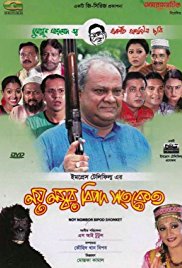| Noy Number Bipod Sanket | |
|---|---|
 Theatrical release poster | |
| নয় নম্বর বিপদ সংকেত | |
| Directed by | Humayun Ahmed |
| Written by | Humayun Ahmed |
| Screenplay by | Humayun Ahmed |
| Story by | Humayun Ahmed |
| Produced by | Ebne Hasan Khan, Faridur Reza Sagar |
| Starring | |
| Cinematography | Mostafa Kamal |
Release date |
|
| Country | Bangladesh |
| Language | Bengali |
Noy Number Bipod Sanket (English: Danger Signal Number Nine) is a 2007 Bangladeshi Bengali comedy-drama film directed by Humayun Ahmed. [1] The film stars Rahmat Ali, Challenger, Jayanta Chattopadhyay, Shadhin Khosru, Tania Ahmed, Rupok Talukder, Shabnam Parvin, Maznun Mizan and Diti in lead roles. [2] The film was shot in Nuhash Polli.